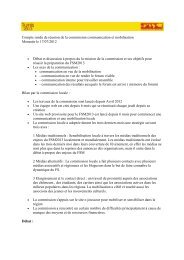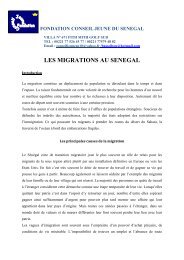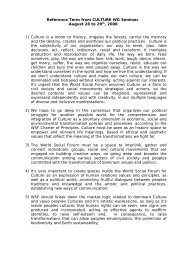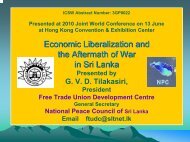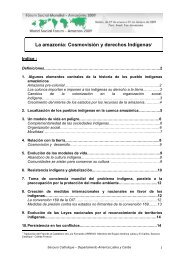You also want an ePaper? Increase the reach of your titles
YUMPU automatically turns print PDFs into web optimized ePapers that Google loves.
<strong>Press</strong> <strong>Report</strong> <strong>Europe</strong> <strong>WSF</strong> <strong>2009</strong><br />
who dropped in to be fêted. The flurry of helicopters and security men seemed out of place. Four leaders (President Lula<br />
was elsewhere) appeared together at a meeting that was billed as a dialogue with the social movements. But the talking<br />
was mostly one way. Mr Chávez gave a long, rambling speech in which he struggled to animate the crowd. “Another<br />
world is possible! No! Another world is necessary,” was as inspiring as it got.<br />
Since its inception, the forum has struggled to get the right balance between a range of attractions: intellectual stars such<br />
as Noam Chomsky and Joseph Stiglitz, both of whom have addressed previous meetings; sympathetic politicians; large<br />
NGOs and the smaller single-issue organisations which often feel squeezed out.<br />
This tension produced the best exchange in the presidential meeting. “You all talk about doing these things,” said João<br />
Pedro Stedile, a founder of the Landless Movement in Brazil, “but when you met in Bahia [in December] you just went to<br />
the beach.” “I didn’t go to the beach,” muttered the Venezuelan leader. “Well, perhaps those of you who are a bit<br />
overweight didn’t go,” Mr Stedile fired back.<br />
Away from this set-piece spat, people were sitting in meeting rooms and coming up with proposals. The ones that dealt<br />
with reforming finance read a bit like a co-production between militant anti-capitalists and more cautious types, which<br />
was no accident. At the far edge was the idea that money and finance are public goods and should be shared out<br />
accordingly, through democracy. The familiar call for a special tax on international transactions was repeated. But there<br />
was plenty of talk that was more moderate and rather more interesting.<br />
The forum suggested that the United Nations should be charged with preventing large trade surpluses and deficits from<br />
building up. Controls on exchange rates and the international movement of capital should be re-established. Credit-rating<br />
agencies should be reformed, incentives for excessive risk-taking reduced and bankers’ bonuses paid on the basis of<br />
long-term performance. Hedge funds, private-equity firms and other parts of the shadow banking system should go,<br />
along with over-the-counter derivatives (OTCs), collateralised-debt obligations (CDOs) and other nefarious structured<br />
products.<br />
In general, a “speculator pays” principle should be introduced and applied when things go wrong. Finally, the world’s<br />
economy should get a stimulus in the form of a green New Deal.<br />
Bits of this belong to the realm of reality; indeed, they might have come from America’s Democratic Party, or even from<br />
the op-ed pages of a respectable business daily. Interestingly, the forum proposed an outright ban on subprime<br />
mortgages, even though it might have been expected to look favourably on lending to people who would otherwise<br />
struggle to get credit.<br />
If some delegates seemed to have thought hard about the economic crisis, the same could not be said of the visiting<br />
presidents. After leading the crowd in a chant of “Fidel, Fidel, Fidel!” Mr Chávez joined Messrs Lugo, Morales and Correa<br />
in a karaoke rendition of “Hasta siempre commandante“—a dirge about the exploits of Che Guevara—before<br />
disappearing. That was far too cruel a fate for the assembled company of Asian bishops, indigenous types in all their<br />
finery, would-be financial reformers and anti-capitalist warriors.<br />
Depressed in Davos (Economist)<br />
Politicians, businessmen and the press met sombrely in Davos for the annual World Economic Forum, reflecting the<br />
global economic crisis. The Russian and Chinese prime ministers, Vladimir Putin and Wen Jiabao, attacked the West for<br />
causing the trouble.<br />
Around 100,000 anti-globalisation activists gathered in the Brazilian city of Belém for the World Social Forum. The<br />
event takes place each year as an alternative to the more business-friendly affair in Davos.<br />
http://www.economist.com/world/displaystory.cfm?story_id=13039022<br />
Alternative views of the economic crisis (BBC)<br />
59




